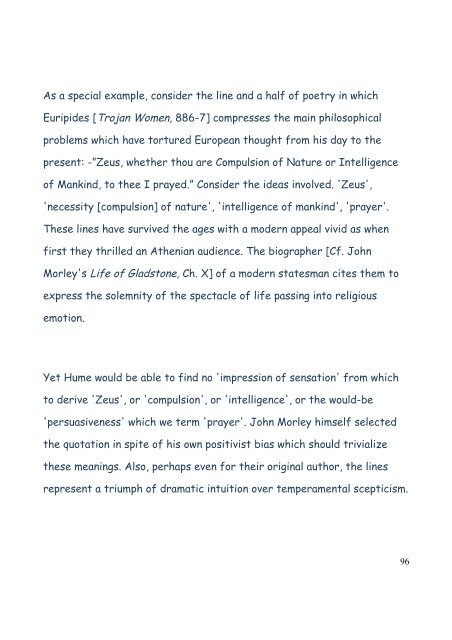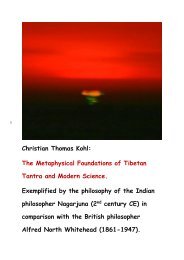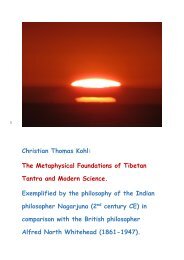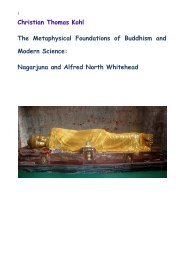Christian Thomas Kohl The Metaphysical Foundations of Buddhism and Modern Science
Christian Thomas Kohl The Metaphysical Foundations of Buddhism and Modern Science
Christian Thomas Kohl The Metaphysical Foundations of Buddhism and Modern Science
Create successful ePaper yourself
Turn your PDF publications into a flip-book with our unique Google optimized e-Paper software.
As a special example, consider the line <strong>and</strong> a half <strong>of</strong> poetry in which<br />
Euripides [Trojan Women, 886-7] compresses the main philosophical<br />
problems which have tortured European thought from his day to the<br />
present: -”Zeus, whether thou are Compulsion <strong>of</strong> Nature or Intelligence<br />
<strong>of</strong> Mankind, to thee I prayed.” Consider the ideas involved. 'Zeus',<br />
'necessity [compulsion] <strong>of</strong> nature', 'intelligence <strong>of</strong> mankind', 'prayer'.<br />
<strong>The</strong>se lines have survived the ages with a modern appeal vivid as when<br />
first they thrilled an Athenian audience. <strong>The</strong> biographer [Cf. John<br />
Morley's Life <strong>of</strong> Gladstone, Ch. X] <strong>of</strong> a modern statesman cites them to<br />
express the solemnity <strong>of</strong> the spectacle <strong>of</strong> life passing into religious<br />
emotion.<br />
Yet Hume would be able to find no 'impression <strong>of</strong> sensation' from which<br />
to derive 'Zeus', or 'compulsion', or 'intelligence', or the would-be<br />
'persuasiveness' which we term 'prayer'. John Morley himself selected<br />
the quotation in spite <strong>of</strong> his own positivist bias which should trivialize<br />
these meanings. Also, perhaps even for their original author, the lines<br />
represent a triumph <strong>of</strong> dramatic intuition over temperamental scepticism.<br />
96


















